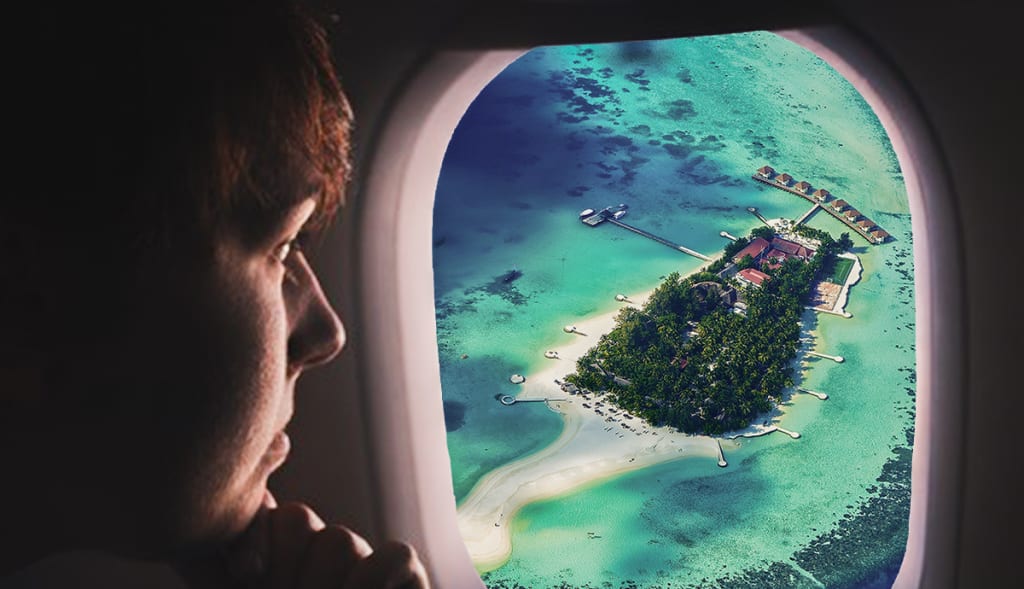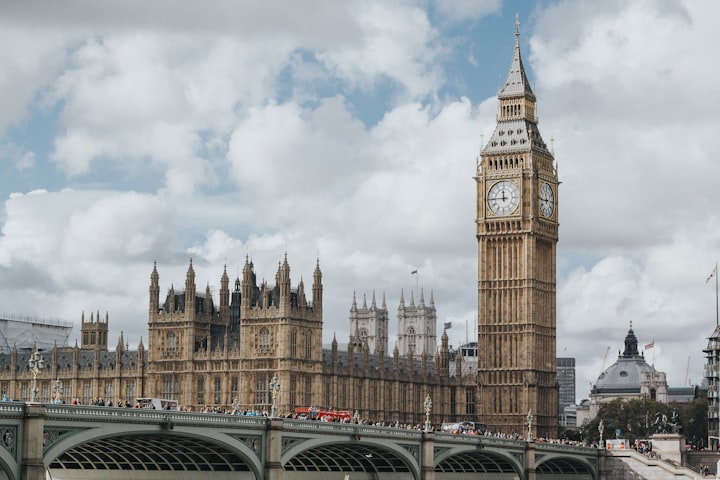A Short Story About Paradise and Where to Find It
Does paradise really consist of pristine white sandy beaches, palm trees and a warm turquoise ocean with beautiful coral reefs and colourful tropical fish, as the travel industry would have us believe?

The Maldives come quite close to the ideal image of paradise. Even from a bird's eye view, the sometimes round, sometimes oval, sometimes elongated atolls with their snow-white beaches in the deep blue of the Indian Ocean look like a masterfully painted picture of an ideal, harmonious and peaceful world.
An estimated 10-year-old boy, who quickly attracted the attention of the entire travel group, obviously did not share this view. He seemed to enjoy our flight to paradise like a prisoner on a transport to the Auschwitz-Birkenau concentration camp. Without the slightest hint of a smile on his face, he let the flight from Male to Dhaalu pass over him. Absent and joyless, he stared out of the window, radiating a sadness I had never seen before in a child.
The seaplane landed on time and we were taken to our accommodations after a short check-in procedure. I had booked a small thatched cottage on the beach. With the green jungle in the background it looked like a relict from Robinson Crusoe. But only until you opened the door and entered the little house. Inside it revealed the luxury of a modern five-star hotel. A soft, wide bed from which I could see the ocean. A nicely decorated dining room, a large flat screen TV, a shelf with books, a free kayak, a bowl with fresh fruit, the obligatory bottle of mineral water and much more. Also included: A butler named Charles, who served dinner in my own dining room on request. He was actually a nice guy, but his job demanded that he always wore a snooty face. He hoped to look like a real English butler, but never got beyond the imitation of a hopelessly broad cliché.
The special design of the entire resort guaranteed guests maximum privacy. The only way for me to meet other people than Charles was to have meals in a large common room near the reception. The way across the beach took nearly 20 minutes. Most of the time I took a small trail through the jungle, which was meant for the staff and saved me 10 minutes of time. It wasn't as if I was in a hurry, I just found the jungle more interesting and didn't want to be permanently exposed to the sun.
At dinner in the common room I saw the sad boy again. Without joy he sat at the table with his parents and poked around in his food. Whatever his problems were, not even the largest and most splendid bird of paradise was able to bring a smile out of his face. He didn't seem to notice the deep orange sunset over the sea, the fascinating underwater world with its colorful shimmering fishes, the lush green of the jungle and all the other beauties and amenities our paradise offered. And we all wondered why.
From my table neighbours, a couple from Australia, I learned that the boy's family lived in one of the water bungalows which were connected by a long jetty. These bungalows had a glass floor through which one could look directly at a coral reef.
In my helplessness I tried to ignore the boy as best I could and spend the holiday as planned by the tour operator. I imagined living alone on this island like Robinson Crusoe. Of course with a little more luxury and without cannibals. The construction of the resort and also the employees helped me to keep up the illusion. I could actually go for long walks on the beach or explore the jungle without encountering a single human soul.
Out of sight, out of mind? No way! This method failed completely. Problems don't disappear if you ignore them. The more I tried to maintain the illusion of a stranded on a lonely island, the more the joyless boy pushed himself into my thoughts. His presence covered the whole island like a creeping poison that ate deeper and deeper into my brain. The boy was like a single storm cloud that murked the otherwise bright blue sky in paradise and didn't want to disappear.
Two days later Angus, one of the Australians I had met in the common room, stood in front of my accommodation. He wanted to hold a kind of war council. I agreed and set off for his beach house around three o'clock in the afternoon.
The accommodation of the Australian couple was a bit bigger than mine, but otherwise looked relatively identical. Angus had managed to assemble twelve vacationers who also felt disturbed by the never smiling boy.
Because one should know the enemy before facing him, we exchanged all the information we could gather about the troublemaker and his parents. His mother was married for the second time and spent her honeymoon here on the island. The boy's family lived in London and there was a rumour that he didn't like his stepfather very much. For me this was no reason to spoil the vacation for all guests, which cost a proud $1,000 USD per night anyhow.
Without any intention, the group split into two camps. Some tried to find a diplomatic solution, while the others demanded tough measures.
Robinson Crusoe, whose well-known tale we should more or less recreate here on this island in order to enjoy a perfect holiday in paradise as promised by the tour operator, changed to The Lord of the Flies. Also a travel story that takes place on an exotic island, but a much less romantic one. It was now about the right of the strongest and about the question who managed to stay civilized and for how long.
Angus didn't make it five minutes. He swung himself up to become the leader of the radical party and described the trigger of our dispute as a pampered urchin who deserves a proper beating. In his opinion, this was the only right way to show this boy the beauty of our paradise.
The other camp, consisting of two European-looking couples, a lady travelling alone and myself, demanded a possibility of defence for the accused. Until no one had talked seriously to his parents or to the boy himself, it was not thinkable to convict and punish him. In addition, there were a few halfway creative suggestions, for example to tickle the boy or to make him something nice. One of the couples even suggested to spend him a trip to a nearby island, which was offered by the hotel for $700 USD. On this occasion he could see the whale sharks living there.
"A free trip for him?" raged Angus. "For what, please? For ruining our holiday? That's out of the question!" His wife tried to calm him down, but that made him even more angry. He demanded compensation for his ruined vacation and promised to take the boy to the other island himself - to abandon him there or feed him to the sharks.
His mental battle axe now also split his family. With a flush of anger in his face, he had to watch his wife change camp. An invisible border, which nobody dared to cross, ran through his beach hut.
Each one of us was boiling with rage. I retired to my own accommodation and asked Charles to serve me dinner there. As I learned later, most of the participants in the failed discussion did the same. No one seriously wanted to see the faces of the others in the common room.
When I entered the common room again two days later, the cold war was not over. Because the hotel set the meal times, it was inevitable that the enemy camps would meet. In order to maintain the fragile peace, the room was divided. Angus and his radical followers, whose numbers had almost doubled, claimed the left half. This was unfavorable because it allowed them to be closer to the buffet and cut off our access to food. On the right side sat the miserable remnants of civilization. A tiny group that didn't know how to maintain law and order.
A row of tables that ran through the entire room was deliberately kept free. Nobody who felt even a hint of the atmosphere that prevailed in this room voluntarily sat down at one of the free seats. Those who were unlucky enough not to get hold of any of the permitted seats either ate in their accommodation or filled their plates wordlessly at the buffet and withdrew.
I didn't see the sad boy and his parents sitting anywhere. I wondered if this family knew that war was going on on the island and if that was why they were avoiding us. That was quite conceivable. The icy atmosphere in the common room, the hate-filled looks we stared at each other with, could not have gone unnoticed.
As long as our war lasted, a tour operator who happened to visit the island could get the impression that we understood his advertising message and actually acted like Robinson Crusoe. Our accommodations, whose location and construction promoted privacy, served as bunkers. Those who didn't necessarily had to leave them stayed there, leaving the beach almost deserted all the time. I used the pool at the back of my beach hut to cool off. There I could observe the colorful birds, flying foxes and small lizards, which dared themselves from the jungle and disappeared again as soon as they discovered me.
For a while I had my meals served in my dining room. Until curiosity drove me back to the common room. Only a few hotel guests sat there. Many of the faces were new, these people must have arrived recently.
These new arrivals and a letter that an employee had pushed through the slit under the door of my beach hut during my absence made it clear to me that time was not infinitely available even in paradise. The letter contained the departure time and a nice farewell greeting from the hotel management.
I spent my last hours on the island packing my suitcase and taking a few walks on the beach. Although there was no concrete reason and the thoughts of our island war gave way to other thoughts about the return journey, I did not dare to go near Angus' beach hut. I didn't want to get too close to his fortress.
Sitting in the plane again, I noticed that the rules of our self-made segregation also applied in the airspace above the island. The members of the moderate camp took their seats on the left side, the radicals on the right side. This happened partly unconsciously, partly intentionally. All held their heads rigidly forward, only to avoid the embarrassing situation of having to greet one from the opposite side with pretended courtesy.
Suspecting that someone from the other camp might have secretly changed places and now sat behind me to push his dagger into my back, I dared to turn around after some time.
The bright smile of the boy almost knocked me out of my socks. He had sat behind me with his parents without me noticing. I was far too busy with my own worries to notice him.
Now he sat there, right behind me, and had a sparkle in his eyes like children normally only get under the Christmas tree. He was the happiest and cheeriest child I have ever seen. And he taught me, without knowing it, a lesson that changed my whole future life.
Paradise is not a place you can find and buy in a travel catalogue. It is deep in our soul and only accessible through our feelings. We often need friends to accompany us on our way to paradise. We spend with them beautiful moments which must be deeply anchored in our subconscious and can be recalled as memories even after years. But there are also people who block our path to paradise. Thanks to their help, the best and most expensive luxury resort on the most beautiful picturesque beach can turn into hell immediately.
His parents told me that the boy, whose name was David by the way, did not generally like to travel. He felt a deep love for a not very clean and unattractive side street in London, where he played with his friends every day. This place was his paradise. His refuge, which he had longed for all the time. It was there that his childhood dreams came true and his thirst for adventure was satisfied.
Happier than anyone else on board and confident to return soon to his paradise, David left all his worries, all his joyless days and his lack of laughter on the atoll in the endless vastness of the Indian Ocean, which became smaller and smaller behind the stern of our seaplane and finally disappeared.






Comments
There are no comments for this story
Be the first to respond and start the conversation.